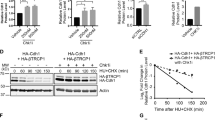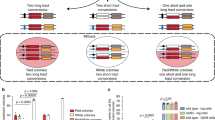Abstract
Here, we show that activation of the checkpoint effector kinase Chk1 in response to irradiation-induced DNA damage is minimal in G1, maximal during S-phase and diminishes as cells enter G2. In addition, formation of irradiation-induced replication protein A (RPA)-coated single-stranded DNA (RPA–ssDNA), a structure required for ATM and Rad3-related (ATR)–Chk1 activation, occurs in a broadly similar pattern. Cyclin-dependent kinase (Cdk) activity is thought to promote RPA–ssDNA formation by stimulating DNA strand resection at double-strand breaks (DSBs), providing one possible mechanism of imposing cell cycle dependence on DNA damage signaling. However, it has recently been shown that Chk1 itself is also subject to Cdk-mediated phosphorylation at serines 286 and 301 (S286 and 301). We show that Chk1 S301 phosphorylation increases as cells progress through S and G2 and that both Cdk1 and Cdk2 are likely to contribute to this modification in vivo. We also find that substitution of S286 and S301 with non-phosphorylatable alanine residues strongly attenuates DNA damage-induced Chk1 activation and G2 checkpoint proficiency, but does not eliminate the underlying cell cycle dependence of Chk1 regulation. Taken together, these data indicate that Cdk activity regulates multiple steps in the DNA damage response pathway including full activation of Chk1 and checkpoint proficiency.
This is a preview of subscription content, access via your institution
Access options
Subscribe to this journal
Receive 50 print issues and online access
$259.00 per year
only $5.18 per issue
Buy this article
- Purchase on Springer Link
- Instant access to full article PDF
Prices may be subject to local taxes which are calculated during checkout






Similar content being viewed by others
References
Bourke E, Brown JA, Takeda S, Hochegger H, Morrison CG . (2010). DNA damage induces Chk1-dependent threonine-160 phosphorylation and activation of Cdk2. Oncogene 29: 616–624.
Cerqueira A, Santamaria D, Martinez-Pastor B, Cuadrado M, Fernandez-Capetillo O, Barbacid M . (2009). Overall Cdk activity modulates the DNA damage response in mammalian cells. J Cell Biol 187: 773–780.
Deans AJ, Khanna KK, McNees CJ, Mercurio C, Heierhorst J, McArthur GA . (2006). Cyclin-dependent kinase 2 functions in normal DNA repair and is a therapeutic target in BRCA1-deficient cancers. Cancer Res 66: 8219–8226.
Enomoto M, Goto H, Tomono Y, Kasahara K, Tsujimura K, Kiyono T et al. (2009). Novel positive feedback loop between Cdk1 and Chk1 in the nucleus during G2/M transition. J Biol Chem 284: 34223–34230.
Helleday T, Lo J, van Gent DC, Engelward BP . (2007). DNA double-strand break repair: from mechanistic understanding to cancer treatment. DNA Repair (Amst) 6: 923–935.
Hochegger H, Dejsuphong D, Sonoda E, Saberi A, Rajendra E, Kirk J et al. (2007). An essential role for Cdk1 in S phase control is revealed via chemical genetics in vertebrate cells. J Cell Biol 178: 257–268.
Huertas P, Cortes-Ledesma F, Sartori AA, Aguilera A, Jackson SP . (2008). CDK targets Sae2 to control DNA-end resection and homologous recombination. Nature 455: 689–692.
Huertas P, Jackson SP . (2009). Human CtIP mediates cell cycle control of DNA end resection and double strand break repair. J Biol Chem 284: 9558–9565.
Ikegami Y, Goto H, Kiyono T, Enomoto M, Kasahara K, Tomono Y et al. (2008). Chk1 phosphorylation at Ser286 and Ser301 occurs with both stalled DNA replication and damage checkpoint stimulation. Biochem Biophys Res Commun 377: 1227–1231.
Ira G, Pellicioli A, Balijja A, Wang X, Fiorani S, Carotenuto W et al. (2004). DNA end resection, homologous recombination and DNA damage checkpoint activation require CDK1. Nature 431: 1011–1017.
Jazayeri A, Falck J, Lukas C, Bartek J, Smith GC, Lukas J et al. (2006). ATM- and cell cycle-dependent regulation of ATR in response to DNA double-strand breaks. Nat Cell Biol 8: 37–45.
Kramer A, Mailand N, Lukas C, Syljuasen RG, Wilkinson CJ, Nigg EA et al. (2004). Centrosome-associated Chk1 prevents premature activation of cyclin-B-Cdk1 kinase. Nat Cell Biol 6: 884–891.
Niida H, Katsuno Y, Banerjee B, Hande MP, Nakanishi M . (2007). Specific role of Chk1 phosphorylations in cell survival and checkpoint activation. Mol Cell Biol 27: 2572–2581.
O'Connell MJ, Walworth NC, Carr AM . (2000). The G2-phase DNA-damage checkpoint. Trends Cell Biol 10: 296–303.
Rainey MD, Black EJ, Zachos G, Gillespie DA . (2008). Chk2 is required for optimal mitotic delay in response to irradiation-induced DNA damage incurred in G2 phase. Oncogene 27: 896–906.
Sancar A, Lindsey-Boltz LA, Unsal-Kacmaz K, Linn S . (2004). Molecular mechanisms of mammalian DNA repair and the DNA damage checkpoints. Annu Rev Biochem 73: 39–85.
San Filippo J, Sung P, Klein H . (2008). Mechanism of eukaryotic homologous recombination. Annu Rev Biochem 77: 229–257.
Satyanarayana A, Hilton MB, Kaldis P . (2008). p21 Inhibits Cdk1 in the absence of Cdk2 to maintain the G1/S phase DNA damage checkpoint. Mol Biol Cell 19: 65–77.
Shiromizu T, Goto H, Tomono Y, Bartek J, Totsukawa G, Inoko A et al. (2006). Regulation of mitotic function of Chk1 through phosphorylation at novel sites by cyclin-dependent kinase 1 (Cdk1). Genes Cells 11: 477–485.
Sung P, Klein H . (2006). Mechanism of homologous recombination: mediators and helicases take on regulatory functions. Nat Rev Mol Cell Biol 7: 739–750.
Walker M, Black EJ, Oehler V, Gillespie DA, Scott MT . (2009). Chk1 C-terminal regulatory phosphorylation mediates checkpoint activation by de-repression of Chk1 catalytic activity. Oncogene 28: 2314–2323.
Wohlbold L, Fisher RP . (2009). Behind the wheel and under the hood: functions of cyclin-dependent kinases in response to DNA damage. DNA Repair (Amst) 8: 1018–1024.
Xu N, Hegarat N, Black EJ, Scott MT, Hochegger H, Gillespie DA . (2010). Akt/PKB suppresses DNA damage processing and checkpoint activation in late G2. J Cell Biol 190: 297–305.
Yata K, Esashi F . (2009). Dual role of CDKs in DNA repair: to be, or not to be. DNA Repair (Amst) 8: 6–18.
Yu X, Chen J . (2004). DNA damage-induced cell cycle checkpoint control requires CtIP, a phosphorylation-dependent binding partner of BRCA1 C-terminal domains. Mol Cell Biol 24: 9478–9486.
Yu X, Wu LC, Bowcock AM, Aronheim A, Baer R . (1998). The C-terminal (BRCT) domains of BRCA1 interact in vivo with CtIP, a protein implicated in the CtBP pathway of transcriptional repression. J Biol Chem 273: 25388–25392.
Zachos G, Rainey MD, Gillespie DA . (2003). Chk1-deficient tumour cells are viable but exhibit multiple checkpoint and survival defects. EMBO J 22: 713–723.
Acknowledgements
We wish to thank Cancer Research UK (CR-UK) and the Medical Research Council of the United Kingdom (MRC) for financial support. N Xu and Y Lao were the recipients of CR-UK China Fellowships, S Libertini was the recipient of a Marie Curie Fellowship. We thank Helfrid Hochegger for many stimulating discussions.
Author information
Authors and Affiliations
Corresponding authors
Ethics declarations
Competing interests
The authors declare no conflict of interest.
Additional information
Supplementary Information accompanies the paper on the Oncogene website
Rights and permissions
About this article
Cite this article
Xu, N., Libertini, S., Black, E. et al. Cdk-mediated phosphorylation of Chk1 is required for efficient activation and full checkpoint proficiency in response to DNA damage. Oncogene 31, 1086–1094 (2012). https://doi.org/10.1038/onc.2011.310
Received:
Revised:
Accepted:
Published:
Issue Date:
DOI: https://doi.org/10.1038/onc.2011.310
Keywords
This article is cited by
-
HDAC1 and HDAC2 integrate checkpoint kinase phosphorylation and cell fate through the phosphatase-2A subunit PR130
Nature Communications (2018)
-
CHK1 expression in Gastric Cancer is modulated by p53 and RB1/E2F1: implications in chemo/radiotherapy response
Scientific Reports (2016)
-
Checkpoint kinase1 (CHK1) is an important biomarker in breast cancer having a role in chemotherapy response
British Journal of Cancer (2015)
-
Pim kinases phosphorylate Chk1 and regulate its functions in acute myeloid leukemia
Leukemia (2014)
-
Working hard for recovery: mitotic kinases in the DNA damage checkpoint
Cell & Bioscience (2013)



